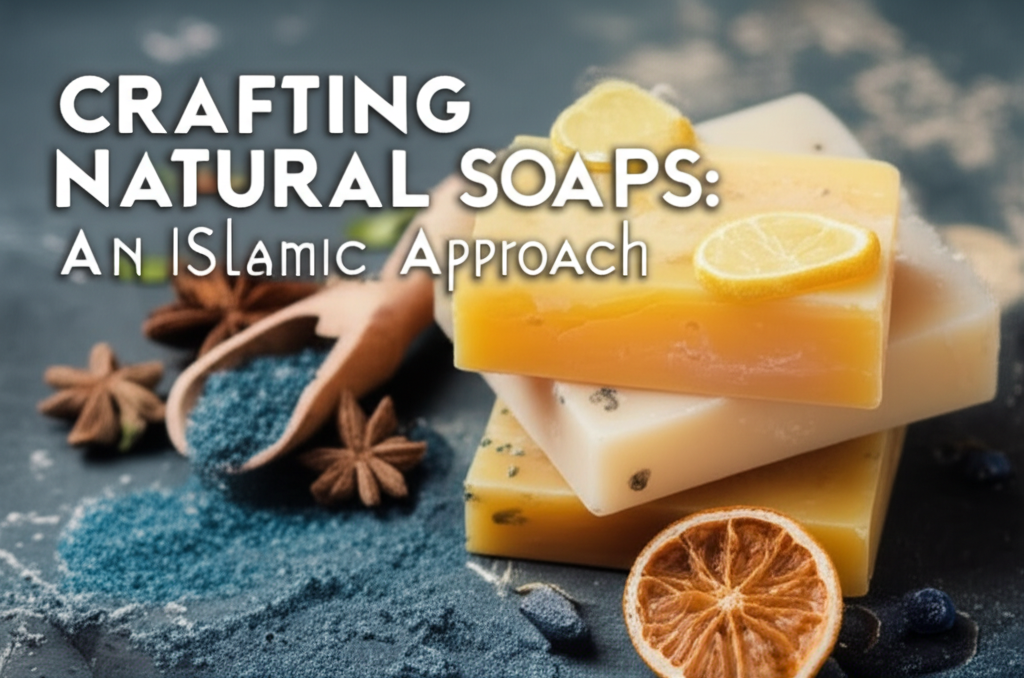In the pursuit of purity and well-being, crafting natural soaps aligns beautifully with Islamic principles. The practice of making soap, known as “sabun” in Arabic, holds a long and rich history within the Muslim world. From ancient civilizations to modern times, soap has been an integral part of Islamic hygiene practices, reflecting the emphasis on cleanliness and ritual purity. This article delves into the fascinating world of crafting natural soaps from an Islamic perspective, exploring its significance, components, benefits, and practical applications.
Understanding Natural Soaps
Natural soaps are handcrafted using traditional methods and primarily rely on natural ingredients. They typically exclude harsh chemicals, synthetic fragrances, and artificial colors, making them gentle on the skin and environmentally friendly.
The Importance of Purity in Islam
Purity is a fundamental concept in Islam, encompassing both physical and spiritual cleanliness. The Prophet Muhammad (peace be upon him) emphasized the importance of ablution (wudu) before prayer, a ritual cleansing that involves washing specific parts of the body with water and soap. This practice highlights the significance of cleanliness in fulfilling religious obligations.
The Prohibition of Haram Ingredients
Islam prohibits the use of certain substances deemed “haram” (forbidden) in various aspects of life, including personal care products. Therefore, when crafting natural soaps, it is essential to ensure that all ingredients are permissible according to Islamic law.
Key Components of Natural Soaps
Natural soapmaking involves a chemical reaction known as saponification. This process combines fats or oils with an alkali, typically lye (sodium hydroxide), to produce soap and glycerin.
Oils and Fats
A variety of oils and fats can be used in soapmaking, each contributing unique properties to the final product. Common choices include:
* Olive Oil: Known for its moisturizing and cleansing properties, olive oil is a staple in natural soapmaking.
* Coconut Oil: Provides a hard, bubbly lather and possesses antibacterial properties.
* Palm Oil: Contributes to a creamy lather and hardness, but it’s crucial to choose sustainably sourced palm oil to minimize environmental impact.
* Shea Butter: Adds a rich, luxurious feel and nourishes the skin.
* Castor Oil: Creates a dense, bubbly lather and helps with lather retention.
Lye (Sodium Hydroxide)
Lye is a strong alkali that reacts with fats and oils to form soap. It’s essential to handle lye with extreme caution, as it is caustic.
Water
Water is used to dissolve the lye and facilitate the saponification process.
Additives (Optional)
Natural soapmakers often incorporate various additives to enhance the soap’s properties or create unique scents and colors. These can include:
* Essential Oils: Provide natural fragrance and therapeutic benefits.
* Herbs and Spices: Add color, texture, and potential therapeutic properties.
* Clays: Offer cleansing and detoxifying benefits.
Benefits and Importance
Crafting natural soaps offers numerous benefits, aligning with Islamic values and promoting overall well-being.
Purity and Cleanliness
Natural soaps, free from harsh chemicals, effectively cleanse the skin while preserving its natural balance. This aligns with the Islamic emphasis on ritual purity and maintaining a clean body.
Skin Health
Natural ingredients in soaps are gentle on the skin, reducing the risk of irritation, dryness, and other skin problems.
Environmental Sustainability
Natural soaps are biodegradable and often packaged in eco-friendly materials, minimizing environmental impact. This aligns with the Islamic principle of preserving natural resources.
Economic Empowerment
Soapmaking can be a source of income and economic empowerment for individuals and communities.
Community Building
Soapmaking workshops and classes can foster a sense of community and shared learning.
Practical Applications
Crafting natural soaps finds practical applications in various aspects of life.
Personal Hygiene
Natural soaps are ideal for everyday use, providing a gentle and effective cleansing experience.
Gift Giving
Handmade soaps make thoughtful and unique gifts for friends and family.
Home Spa Treatments
Natural soaps can be incorporated into DIY spa treatments, such as exfoliating scrubs and relaxing baths.
Frequently Asked Questions
What is the process of making natural soap?
Making natural soap involves a chemical reaction called saponification. Oils or fats are combined with lye (sodium hydroxide) and water. The mixture is heated and stirred until it reaches a specific consistency. The soap is then poured into molds and allowed to cure for several weeks.
Is it safe to use lye in soapmaking?
Lye is a caustic substance and must be handled with extreme caution. Always wear protective gear, such as gloves and goggles, when working with lye. Follow safety precautions and recipes carefully.
What are some common essential oils used in natural soapmaking?
Popular essential oils for natural soapmaking include lavender, tea tree, peppermint, rosemary, and citrus oils.
Can I use any type of oil for soapmaking?
While many oils can be used, some oils, such as coconut oil and olive oil, are more commonly used in soapmaking due to their properties.
How long does it take for natural soap to cure?
Natural soap typically requires 4-6 weeks to cure. During curing, the soap hardens and the excess water evaporates.
Conclusion
Crafting natural soaps offers a fulfilling and rewarding experience that aligns beautifully with Islamic values. From the emphasis on purity and cleanliness to the use of natural ingredients, soapmaking embodies the principles of sustainability and well-being. By embracing this traditional craft, individuals can connect with their heritage, promote their health, and contribute to a more conscious and ethical approach to personal care.

